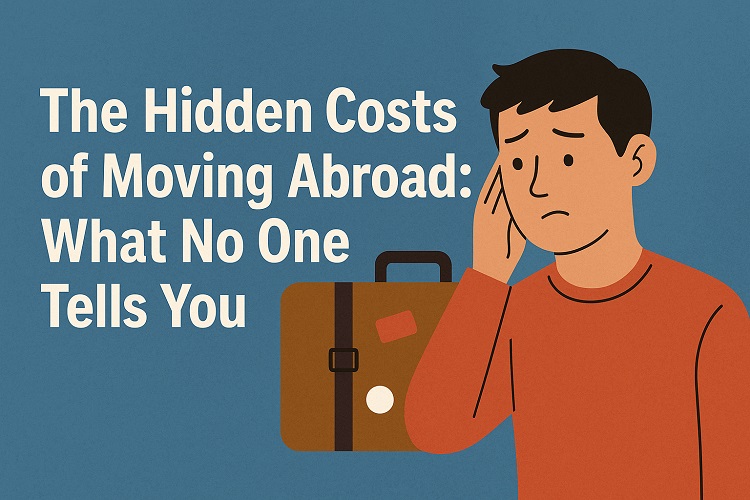When we think of moving abroad, our minds often wander to the exciting parts—new cultures to explore, fresh starts, better job opportunities, or simply the thrill of adventure. Social media is packed with people showing off their new lives in Paris, Tokyo, or Cape Town, making the experience look like a dream. But for every picturesque photo of a European café or a tropical beach, there’s often a silent struggle behind the scenes.
What many don’t talk about are the hidden costs—emotional, financial, and psychological—that come with uprooting your life and starting over in a new country. The truth is, moving abroad can change your life, but it often comes with challenges no one prepares you for.
Let’s pull back the curtain and explore what really happens when you move abroad—and what no one tells you until it’s too late.
The Emotional Price of Leaving Home
The moment you board that plane and wave goodbye to your family and friends, you begin paying an emotional toll that isn’t always easy to predict. For some, the homesickness hits immediately. For others, it creeps in like fog—quietly, subtly, but persistently.
You might miss birthdays, weddings, funerals, and random Sunday dinners that once seemed mundane. You’ll feel the absence of familiar smells, languages, and the unspoken comfort of being surrounded by people who just “get” you. Even time zones become emotional barriers. A 6-hour difference means you’re waking up just as your best friend is going to bed. Conversations become fewer, shorter, and more surface-level, despite everyone’s best intentions.
There’s also a strange kind of grief that comes with building a new life while watching your old one continue without you. Friends move on. Relationships change. And in your quest to belong somewhere new, you might feel like you no longer truly belong anywhere.
Expat communities can help, and technology makes the world feel smaller, but nothing quite replaces the feeling of walking into your mom’s kitchen, uninvited, and helping yourself to food while catching up about life. That emotional disconnection can weigh heavily—especially during holidays or in moments of personal struggle when all you want is a hug from someone who knows your story.
Unexpected Financial Burdens
You might think you’ve budgeted everything—plane tickets, first month’s rent, maybe a language course or two. But living abroad often comes with a slew of hidden costs that can quickly throw even the most meticulous planner off course.
Let’s start with visa and legal fees. These aren’t just one-time costs. In many countries, you have to renew permits annually, and each time there’s a new fee, paperwork, or medical test. Some countries even require financial proof that you can support yourself—for students, digital nomads, or retirees, this can mean showing thousands of dollars in savings.
Then there’s currency conversion and international banking. Every time you move money across borders, your bank might charge you hidden fees, or you could lose out on poor exchange rates. You might find yourself opening a local bank account, but even that can be a bureaucratic and expensive endeavor.
Healthcare is another silent wallet-drainer. Even in countries with “free” healthcare, newcomers often need to pay for private insurance until they’re fully integrated into the system. And if you’re coming from a country like the U.S., you might be surprised to learn how much of a difference even small medical appointments can cost abroad—sometimes more, sometimes less, but always confusing.
Then come the unexpected everyday expenses: setting up a new phone plan, getting furniture for your flat, dealing with a deposit you may never get back, or realizing your favorite shampoo isn’t sold anywhere in your new country (and the imported version costs three times more).
The financial reality of living abroad can be humbling, especially in the early months when you’re still finding your feet and every small expense feels magnified.
Culture Shock and Identity Crisis
Living in a new culture is thrilling—until it’s not. At first, everything is novel and interesting: the food, the customs, the way people greet each other or drink coffee. But once the honeymoon phase fades, reality sets in, and you may find yourself navigating what psychologists call culture shock.
This isn’t just about missing home. It’s about feeling like a fish out of water every single day. Maybe the humor doesn’t translate, or the pace of life feels alien. Maybe you misread social cues or accidentally offend someone without realizing it. Even small things—like not knowing how to line up at a grocery store or struggling with unfamiliar bureaucracy—can chip away at your confidence.
What’s worse, you may begin to question who you are. Your identity, once shaped by your culture, language, and familiar environment, starts to shift. Are you still “you” in a place where no one pronounces your name correctly or understands your jokes?
For some, this transformation is empowering. You become more adaptable, more resilient. But for others, it can feel like you’re losing touch with yourself. You start to wonder: Do I belong here? Do I belong anywhere?
Ironically, even visiting home can be disorienting. You realize how much you’ve changed—and how much your friends and family haven’t. It’s a strange in-between state that many expats describe as feeling like a foreigner in both places.
Hidden Bureaucratic Hurdles
If you thought paperwork in your home country was annoying, brace yourself. Moving abroad often comes with a mountain of bureaucracy, much of it in a language you may not fully understand.
From visas to residence permits, tax registrations to driver’s licenses, each country has its own labyrinth of rules—and they’re rarely explained clearly. A single form might require 10 documents, some of which you need to obtain from your home country, translated and notarized at a consulate that’s booked three months in advance.
Even once you’re “legal,” the red tape doesn’t end. Want to open a bank account? You might need proof of address—often a utility bill. But to get utilities in your name, you need a bank account. That’s the kind of maddening catch-22 many newcomers face.
Then there’s the issue of employment laws, taxation, and residency status. Are you allowed to work remotely for a foreign company? What happens during tax season? Are you accidentally double-taxed? Many people end up needing expensive legal advice just to avoid penalties or overstays.
And if you ever decide to leave and return home? Be prepared to untangle another web of red tape—closing accounts, transferring pensions, selling property, and ensuring you don’t burn bridges for potential future returns.
No one tells you that even after moving abroad, you might still spend years dealing with your home country’s bureaucracy—from renewing your passport to maintaining your voter registration or figuring out your social security contributions.
Is It Worth It in the End?
With all these hidden costs, you might wonder: Why do people still do it?
Despite the challenges, for many, the answer is yes—it is worth it. But not for the reasons Instagram influencers often suggest.
It’s worth it because of the personal growth. Living abroad stretches you in ways nothing else does. You develop a thicker skin, greater empathy, and a more nuanced worldview. You become more independent, more resourceful, and more appreciative of both your new home and where you came from.
It’s worth it for the new relationships—friends who become family, love stories that couldn’t have happened anywhere else, mentors who change your life, and communities that embrace you in ways you never imagined.
And sometimes, it’s worth it simply because it opens up possibilities. A better job, a safer environment, a healthier lifestyle, or a new language that opens doors professionally and personally.
But none of that erases the fact that moving abroad is not just a physical relocation—it’s a mental, emotional, and financial marathon. It’s not always glamorous, and it’s certainly not always easy. The people who thrive are usually those who are willing to be uncomfortable, to ask for help, to learn constantly, and to redefine what success and happiness mean to them.
In Conclusion
Moving abroad is often painted as the ultimate escape or opportunity, but it comes with trade-offs. Yes, it can be magical, liberating, and life-changing. But it’s also filled with quiet sacrifices, invisible battles, and unspoken costs.
If you’re considering such a move, go into it with open eyes and a full heart. Prepare as much as you can—but also be ready for the things no guidebook or YouTuber will tell you.
Because while moving abroad might cost more than you imagined, it might also give you more than you ever thought possible.





